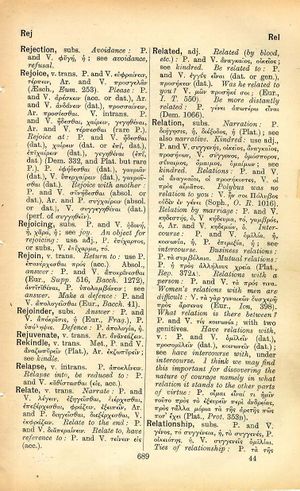relation: Difference between revisions
ὦ πολλῶν ἤδη λοπάδων τοὺς ἄμβωνας περιλείξας → you who have licked the labia of many vaginas (Eupolis fr. 52)
(CSV4) |
m (Text replacement - "<b class="b2">Ion</b>" to "''Ion''") |
||
| Line 10: | Line 10: | ||
<b class="b2">Mutual relations: P</b>, ἡ πρὸς ἀλλήλους [[χρεία]] (Plat., ''Rep.'' 372A). | <b class="b2">Mutual relations: P</b>, ἡ πρὸς ἀλλήλους [[χρεία]] (Plat., ''Rep.'' 372A). | ||
<b class="b2">Relations with a person</b>: P. and V. τὰ [[πρός]] τινα. | <b class="b2">Relations with a person</b>: P. and V. τὰ [[πρός]] τινα. | ||
<b class="b2">Women's relations with men are difficult</b>: V. τὰ γὰρ γυναικῶν δυσχερῆ πρὸς ἄρσενας (Eur., | <b class="b2">Women's relations with men are difficult</b>: V. τὰ γὰρ γυναικῶν δυσχερῆ πρὸς ἄρσενας (Eur., ''Ion'', 398). <b class="b2">What relation is there between?</b> P. and V. τίς [[κοινωνία]]; with two genitives. | ||
<b class="b2">Have relations with</b>, v.: P. and V. ὁμιλεῖν (dat.), προσομιλεῖν (dat.), κοινωνεῖν (dat.); see <b class="b2">have intercourse with</b>, under [[intercourse]]. | <b class="b2">Have relations with</b>, v.: P. and V. ὁμιλεῖν (dat.), προσομιλεῖν (dat.), κοινωνεῖν (dat.); see <b class="b2">have intercourse with</b>, under [[intercourse]]. | ||
<b class="b2">I think we may find this important for discovering the nature of courage namely in what relation it stands to the other parts of virtue</b>: P. [[οἶμαι]] εἶναί τι ἡμῖν τοῦτο πρὸς τὸ ἐξευρεῖν περὶ ἀνδρείας, πρὸς τἄλλα μόρια τὰ τῆς ἀρετῆς πῶς ποτʼ ἔχει (Plat., ''Prot.'' 353B). | <b class="b2">I think we may find this important for discovering the nature of courage namely in what relation it stands to the other parts of virtue</b>: P. [[οἶμαι]] εἶναί τι ἡμῖν τοῦτο πρὸς τὸ ἐξευρεῖν περὶ ἀνδρείας, πρὸς τἄλλα μόρια τὰ τῆς ἀρετῆς πῶς ποτʼ ἔχει (Plat., ''Prot.'' 353B). | ||
}} | }} | ||
Revision as of 13:54, 7 August 2017
English > Greek (Woodhouse)
subs.
Narration: P. διήγησις, ἡ, διέξοδος, ἡ (Plat.); see also narrative. Kindred: use adj., P. and V. συγγενής, οἰκεῖος, ἀναγκαῖος, προσήκων, V. σύγγονος, ὁμόσπορος, σύναιμος, ὅμαιμος, ὁμαίμων; see kindred. Relations: P. and V. οἱ ἀναγκαῖοι, οἱ προσήκοντες, V. οἱ πρὸς αἵματος. Polybus was no relation to you: V. ἦν σοι Πόλυβος οὐδὲν ἐν γένει (Soph., O.R. 1016). Relation by marriage: P. and V. κηδεστής, ὁ, V κήδευμα, τό, γαμβρός, ὁ, Ar. and V. κηδεμών, ὁ. Intercourse: P. and V. ὁμιλία, ἡ, κοινωνία, ἡ, P. ἐπιμιξία, ἡ; see intercourse. Business relations: P. τὰ συμβόλαια. Mutual relations: P, ἡ πρὸς ἀλλήλους χρεία (Plat., Rep. 372A). Relations with a person: P. and V. τὰ πρός τινα. Women's relations with men are difficult: V. τὰ γὰρ γυναικῶν δυσχερῆ πρὸς ἄρσενας (Eur., Ion, 398). What relation is there between? P. and V. τίς κοινωνία; with two genitives. Have relations with, v.: P. and V. ὁμιλεῖν (dat.), προσομιλεῖν (dat.), κοινωνεῖν (dat.); see have intercourse with, under intercourse. I think we may find this important for discovering the nature of courage namely in what relation it stands to the other parts of virtue: P. οἶμαι εἶναί τι ἡμῖν τοῦτο πρὸς τὸ ἐξευρεῖν περὶ ἀνδρείας, πρὸς τἄλλα μόρια τὰ τῆς ἀρετῆς πῶς ποτʼ ἔχει (Plat., Prot. 353B).

